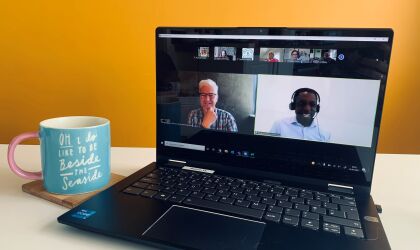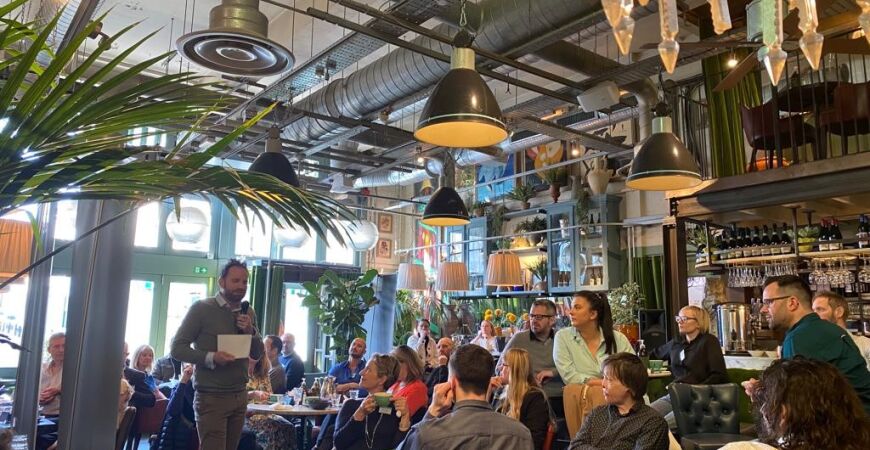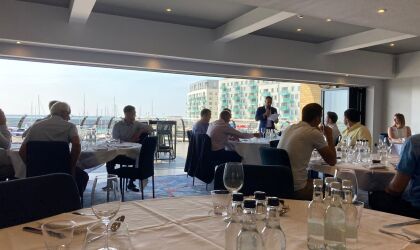

Tue 12 / 04 / 22
"A single truckload of cement has the same co2 as driving your car halfway around the world"
Bek Kimber from Create.net writes after March's Chamber Breakfast, with guest speaker James Bailey from Roadways.
By Bek Kimber of Create Website Builder
“A single truckload of cement has the same co2 as driving your car halfway around the world.”
James' breakfast talk was open and insightful about how he has approached managing and growing a business in the construction industry.
James and his partner Victoria moved down from London and bought the business with advice from a friend in corporate finance. Even though they had no experience in the industry itself, their transferrable skills and business acumen got them some initial success in turning around the ailing construction business.
Roadways had been run for nearly fifty years by the same owner who was turning 70. It had lost its drive and been drifting along. Their injection of enthusiasm as new owners buoyed the first year as James and Victoria saw a big boost in morale, investing in the team and taking positive action around the low hanging fruit.
Hitting a wall
It wasn't until the second year that they hit the wall, and a programme of investment began. More than half their lorries were over 10 years old and they started breaking down, the sites needed new plant equipment and this meant a lot of training.
But things got worse that year as gradually their customers left, and many of the staff did too. James and Victoria were at a loss. They didn't understand what was happening. They were investing in coaching techniques, training and all the things you had in the corporate world they’d left behind. They were giving pay rises. But every Monday morning they'd face more letters of resignation.
Listening to James, the helplessness he felt in this situation is obvious, and must have been incredibly hard to deal with. Especially when you're pushing to move the business in the right direction for everyone involved. What's also keenly felt is the determination and grit needed to just keep going. James touches on this when asked a little later about how he continued on - “It was absolute naivete and I didn't understand how hard it was going to be. We also didn't have a plan B and there wasn't a way out of it. So that meant we just kept going…”
Real life “Life on Mars”
One of the other driving forces for James and Victoria was their sense of fairness. James lifts the lid to share that the construction industry is still very much stuck in the 1970's, rife with bad behaviour, sexual discrimination and ancient practices. Of the project managers they've employed, three have been thrown off sites - all three of them have been women!
These experiences have built their determination to keep going, push industry change and look at how to build more values into Roadways. James describes this as where “good has to triumph over evil in the long run”, but winning the fight is obviously tough.
In the following years, James and Victoria kept looking for more customers, but the only real way to win more business was to do it cheaper, and they were already running at incredibly low profit margins. This meant they had to find a way to differentiate. They looked at technology, at sustainability and at social values - what could they do to win tenders?
Being the change
So, alongside recruiting outside the industry for lots of roles, creating opportunities for new starters to grow careers, they implemented new practices and efficiencies.
They've also placed a big focus on how they can reduce the carbon footprint of the roads they build. With the construction industry contributing around 40% of the CO2 emissions produced globally and cement alone being 8% of all global emissions, there is a huge opportunity to reduce the enormous negative contribution it's having on climate change.
What surprises many of us is that measuring the impact of this change in materials is really down to Roadways. Highways England have targets and James reports on things like how many miles a contractor's trucks drive, or sits idling on the sites. Highways England are not asking about the concrete or the asphalt that's actually being used.
This is where the really big CO2 savings could be made if the industry shifted to lower carbon materials. These are readily available, surprisingly cost the same and do the same job. Perhaps not so surprisingly (as we learnt about the industry during breakfast) they aren't widely adopted!
As we wrap up, James is asked how he's going to make the industry less old fashioned. He tells us, “by not accepting old behaviours and norms. We’re differentiating ourselves through innovation and investing in people, and new technologies that enable social change.”
Any business whose actions tie together purpose, people and profit will find it harder to compete at higher prices against those just offering the cheapest deal, but as we’ve learnt this morning they'll also find new doors that open, greater engagement from their teams, and new customers who share their values.
Rebecca Kimber is CEO of Create.net, a Brighton-based company enabling small business owners to design their own websites.
Find the monthly Chamber Breakfast, plus more networking events by heading over to the Chamber's event page:
If you want to contribute to the Chamber blog, contact us on hannah@brightonchamber.co.uk



